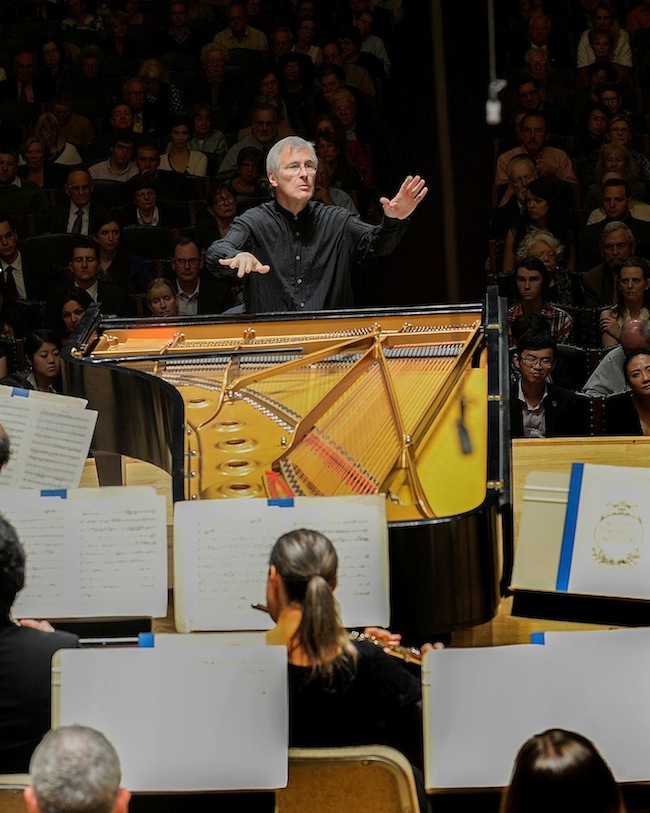Post-Nelsons, BSO stumbles badly with Zacharias

Christian Zacharias was soloist and conductor with the BSO Thursday night at Symphony Hall. Photo: Stu Rosner
Thursday night in Symphony Hall, one had to wonder whether one was trapped in a bad dream.
The Boston Symphony Orchestra, which had played with such skill and heart under its new music director Andris Nelsons just days before, was now giving its most ramshackle, disoriented performance in this listener’s experience.
In a program of music by Schubert and Mozart led (if that’s the word) by the pianist Christian Zacharias, almost nothing seemed to go right for this celebrated ensemble. Coordination, tuning, rhythm, balance—all the things at which this orchestra normally excels–were not just off, but conspicuously, painfully off.
In place of the BSO’s usual bright and transparent texture, a murky, congealed sound emanated from the Symphony Hall stage as the players felt their way through some theater music by Schubert.
The entr’actes and ballet from Rosamunde, Fürstin von Zypern were admittedly not the strongest material to work with. In the program notes, Jan Swafford did his best to link these little movements in B minor with the great “Unfinished” Symphony in that key, composed the year before, even hinting that one of them just might be the lost finale to that masterwork.
But these pieces, composed in haste for a doomed play that ran all of two performances, were clearly not in a league with the symphony. Some charms might be found in them under better circumstances, but on Thursday night even the Entre’acte III, featuring one of Schubert’s most beloved melodies, sounded dull and unfocused.
One hoped that in the next piece, Mozart’s Piano Concerto No. 17 in G major, K. 453, with Zacharias as both conductor and soloist, some lively piano playing might lift the level of performance. Sadly, the orchestra was in as poor shape for its long first-movement exposition as it had been earlier. Zacharias at the piano seemed little better, putting in a performance that was routine and sometimes even a little prissy, recalling the Dresden-figurine-style Mozart playing that was common a generation or two ago.
Perhaps removing the piano’s lid and pointing the instrument upstage, the better for the pianist-conductor to face the orchestra, put the piano at an acoustical disadvantage in the large hall. But it’s unlikely that turning the piano around would have given Zacharias’s playing more color range and sparkle than the limited amount it had Thursday night.
The ensemble’s woes of execution prevented either the lyricism of the Andante or the saucy wit of the Allegretto variations from registering. The violins sounded wooden introducing the slow movement’s tender theme, and it was a shock to hear the BSO’s justly-admired woodwind section playing so blatantly out of sync and out of tune. For his part, the pianist tended to play just notes, not a singing line.
The orchestra could not even agree on a tempo for the finale’s simple, folk-like theme, although it pulled together a bit in the Presto conclusion.
Orchestra and conductor led off after intermission with one more Rosamunde number, the Entr’acte I, the putative finale of the B minor Symphony, before going on to the symphony itself. By placing it first, and linking it to the symphony with just a brief pause, Zacharias was apparently on a different errand than promoting the “finale” theory.
But it was hard to tell what that errand was, since this curiously immature-sounding, awkwardly scored piece certainly didn’t add a cubit to the stature of the great symphony that followed. One wondered if, the 1823 date notwithstanding, Schubert had dug deep in his drawer of schoolboy compositions to retrieve it.
In any case, the players seemed to have heard a rousing half-time speech in the locker room, since they attacked the Entr’acte’s assertive opening with accuracy and gusto. Ensemble fell off again, however, in the piece’s more graceful second theme.
When they got to the “Unfinished,” one sensed that at least the horse knew the way to the barn no matter who was driving, and the performance would be OK. That, however, didn’t prevent another disagreement over tempo between the cellos and their accompaniment in the first movement’s subsidiary theme, or laxity of ensemble and rhythm in the Andante con moto.
One can only hope subsequent performances of this program will come together better. Thursday’s concert was, if nothing else, a reminder of what a miracle it is when that many musicians catch the same wave and play together as one, as the Boston Symphony Orchestra does most nights.
The program will be repeated 1:30 p.m. Friday and 8 p.m. Saturday. bso.org; 617-266-1200.
Posted in Performances




Posted Oct 10, 2014 at 5:46 pm by Nick van Boston
“Go BSO!”